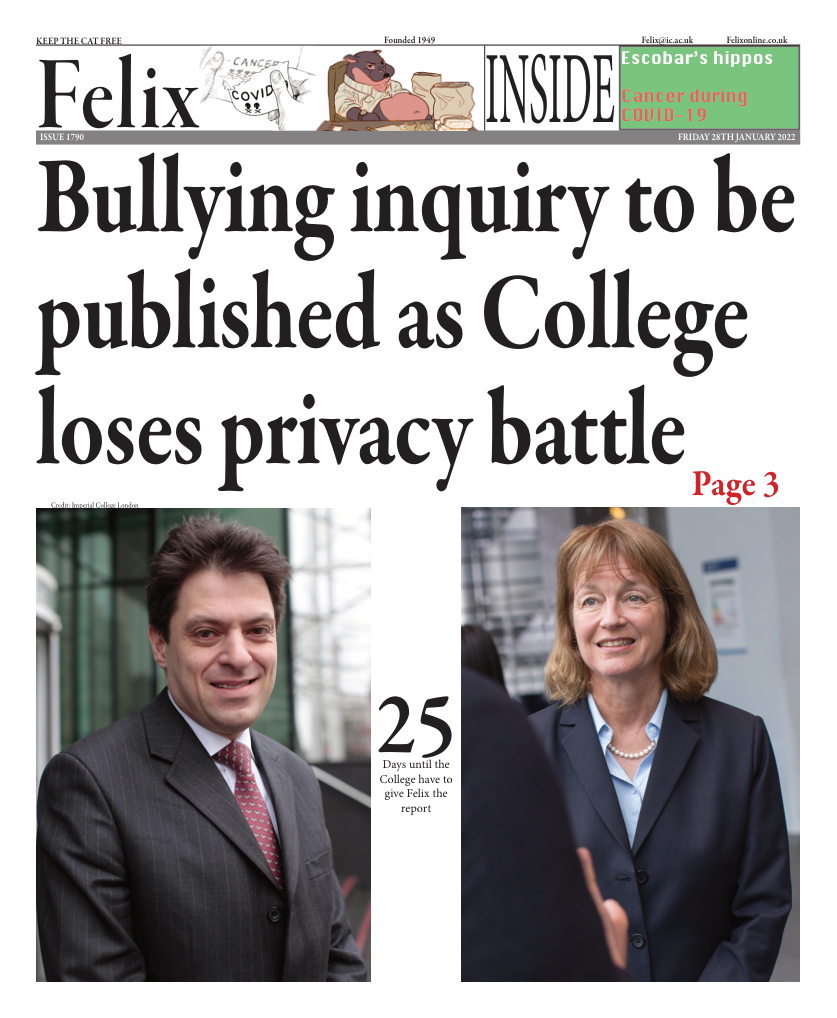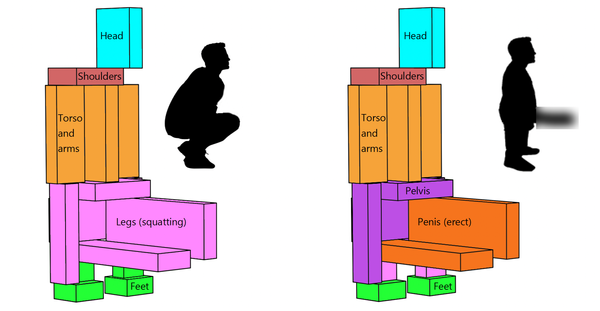Imperial College ordered to release redacted version of bullying report
Imperial College’s Council, including President Alice Gast and CFO Muir Sanderson, have lost a bid to keep a report into bullying at Imperial College unpublished.

It is worth noting that Gast was advised by independent individuals in making this reasoning, however, according to the Commissioner, these individuals had not seen the report.
Imperial College’s Council, including President Alice Gast and CFO Muir Sanderson, have lost a bid to keep a report into bullying at Imperial College unpublished.
The motion, brought against Imperial College Council by the Daily Mail, sought to force the publication of the report via a Freedom of Information request.
Imperial College is a public body, and as such must comply with such requests.
Imperial College’s Council sought to block this publication under the Freedom of Information Act, citing that information contained in the document would ‘prejudice... the effective conduct of public affairs’ and that the document contained third party personal data that should not be published. They also claimed that release of the information would “contravene... the data protection principles [of the Data Protection Act 2018]”.
The information commissioner found that “the public interest favours” disclosure of the information and therefore that the claim its release would ‘prejudice... the effective conduct of public affairs’ was untenable. The commissioner accepted that the release of some of the information contained in the report would contravene data protection principles, but ordered the College to release the majority of the report, with those specific parts redacted.
The report from the Information Commissioner also stated that the College had failed to issue a refusal notice within the allocated time frame of 20 working days when the request was initially received, and had therefore further breached the Freedom of Information Act.
Against disclosure, the College argued that the report contained information about Gast’s and Sanderson’s personal lives, though the Commissioner did not agree with this argument.
The College also argued that the report contained many details about the personal lives of those who were interviewed and the original whistleblower(s). The College argued on top of this that during the investigation there had been multiple assurances from the investigating QC and the College’s internal policy that the proceedings in the investigation would be kept confidential. The Commissioner agreed with the first statement, highlighting that in some cases ‘special category data’ relating to the witnesses had been included. Special category data includes that pertaining to someone’s race, sexual orientation and health, as well as other data. However, having reviewed the report, the commissioner concluded that aspects of discourse during the investigation suggested that the findings may be shared “in certain circumstances” and that the witnesses’ fears were more surrounding internal backlash, as opposed to a reveal to the public. In fact, the commissioner considered that a public disclosure would provide more protection to witnesses rather than less, as any internal backlash would be more intensely scrutinised.
Despite this, the commissioner decided that prior expectation of such an investigation to remain confidential outweighed any legitimate interest for disclosure, and therefore decided that no information that could lead to the identification of any witnesses could be published.
During the investigation, Gast wrote a letter containing “strong objections to the disclosure of her personal data” to the Commissioner. In this letter, she reiterated that further disclosure would “not add any insight” into proceedings. She also added that “female leaders accused of bullying were treated less generously than male leaders” and drew parallels between her case and that of Kathleen Stock, an ex-professor of Philosophy at the University of Sussex who resigned near the end of 2021 due to continued pressure from students who opposed her views on transgender people. The Daily Mail described this comparison as “bizzare”, and noted that Stock had not been accused of bullying nor had her conduct probed.
She added that the report included “’few, relatively minor, findings against [her]’ and that she had ‘serious concerns’ about the accuracy of some of the report”.
Gast said that the information that has already been made public has led to her being attacked on social media and by the media in general (not least the Daily Mail, who brought this complaint to the ICO). Gast added that this abuse had “had a substantial effect on both her and her family – which further disclosure would exacerbate”. Felix is vehemently against any abuse like that described above, and strongly urges all readers not to consider carrying out anything similar. The Commissioner described the abuse as ‘unacceptable in a civilised society’.
All considered, the Commissioner decided that it was not reasonable for Gast and Sanderson to expect the information to be withheld. That they hold such senior roles within the College means “they should expect to be subject to a much greater degree of scrutiny, accountability and transparency than their subordinates”.
On redaction, the Commissioner ruled that as some parts of the report, particularly those that detailed the events that took place, contained so many personal details of the witnesses, that they should not be published at all.
The Commissioner’s final judgement is that “there is a stronger than usual public interest in disclosing more of the report so that staff and students at the College can decide for themselves”. Rest assured findings will be in Felix the moment we see it.
Imperial College issued a statement saying that they “may... appeal part of [the] decision”. They clarified that more than 50 people had acted as witnesses in the internal investigation.
The College added that, since the investigation and disciplinary process, “Imperial’s culture and leadership style have been significantly improved”, and that all 12 recommendations from the internal report have been implemented fully.
The infamous email, sent to all students and staff in December 2020 which included the line “*Following this process, I am more confident than ever that Imperial has the right leadership*”, was described as a “judgement call” made by the College.
Any mention of the Daily Mail article breaking this news was conveniently left off the daily Imperial College News Digest.








